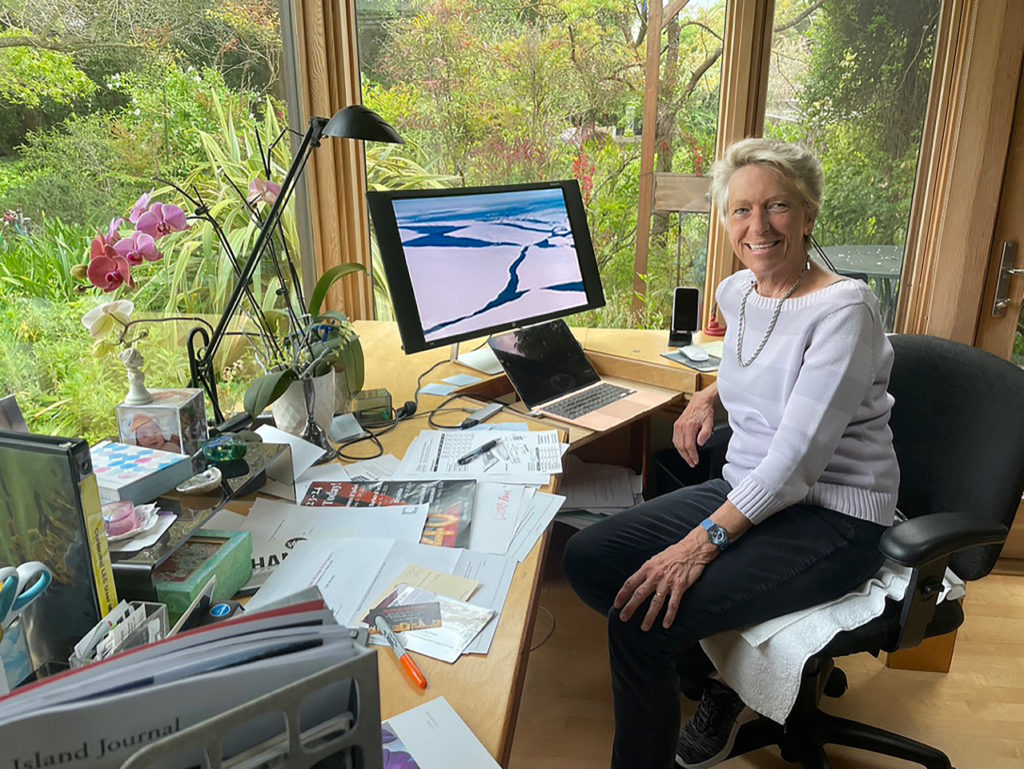A Conversation between Bay Area playwright Sharmon Hilfinger and Katherine Bazak
As I sit across the table talking with Sharmon Hilfinger, I see the embodiment of two different women who are elegant, gracious, and intelligent. One is a wife, a mother, a musician; the other is an artist/writer committed to portraying her view of life and the world around her. As a playwright, she has chosen the theater to tell her truths under the guise of entertainment.
Theater is a tough art form to navigate. One must try to get their play off the page and onto the stage. It is impressive to meet someone with Sharmon’s track record. Her produced plays include three dramas and nine ensemble plays with music in collaboration with composer Joan McMillen. These have been produced by San Francisco Bay Area theatre companies, including The Pear Theatre, TheatreFIRST, Inferno Theatre, Menlo Player’s Guild, BootStrap Theater Foundation, as well as Heartland Theatre Company in Illinois. In 1998, she founded BootStrap Theater Foundation which develops and produces original plays by Bay Area playwrights.

Katherine: Let’s start at the beginning. I know that I saw An Ideal Mother some time in the early 90s. Was that your first play?
Sharmon: Well it was’t the first play I’d written, but it was the first play of mine that was produced. I read somewhere that The Menlo Players, at Burgess Park Theater in Menlo Park, was asking for scripts, so I sent it in. The director, Dean Burgee, called me immediately and it was produced in 1992. Beginner’s luck!
Katherine: Had you written anything before 1992?
Sharmon: I had been writing for a long time. I’m not quite sure how to say this—writing was my consolation prize for failure. I was an actor and I was admitted to the Conservatory program at Carnegie Mellon. It was, and still is, a University degree structured as a conservatory program, very unusual at that time. It was heaven! Theater classes all day, crewing shows at night—24/7 theater. It wasn’t easy to get in, and it wasn’t easy to stay in. They had a policy of accepting a certain number of students and cutting 10% of the class after the first year. It was very rigorous and class attendance was mandatory. I was there in 1970 when the Kent State Vietnam War protest killings happened. I cut classes to march on Washington D.C., which did not help my standing in the department. I’m sure there were other reasons (I was not given any kind of performance review) for why I was cut from the program.
That was traumatic! I was devastated. I came home and finished up my BFA in Drama at Illinois Wesleyan University in Bloomington, Illinois (my hometown). IWU is one of those gems of a good liberal arts college and had a very strong drama department. I grew up getting my theater education there because I went to all the plays they put on—the Head of the Drama Department was surprisingly avant-garde. I finished my BFA in drama, but I had it in my head that I couldn’t expect to pursue a professional career in acting, I was a failure, this profession was not for me. So I gave up theater! My creativity had to go somewhere, and I started writing instead. I wrote a novel, and a number of short stories over the following years. Whatever my day job was, I would get up at six in the morning and write before I went to work. First thing in the morning is still the best time for me to write.
